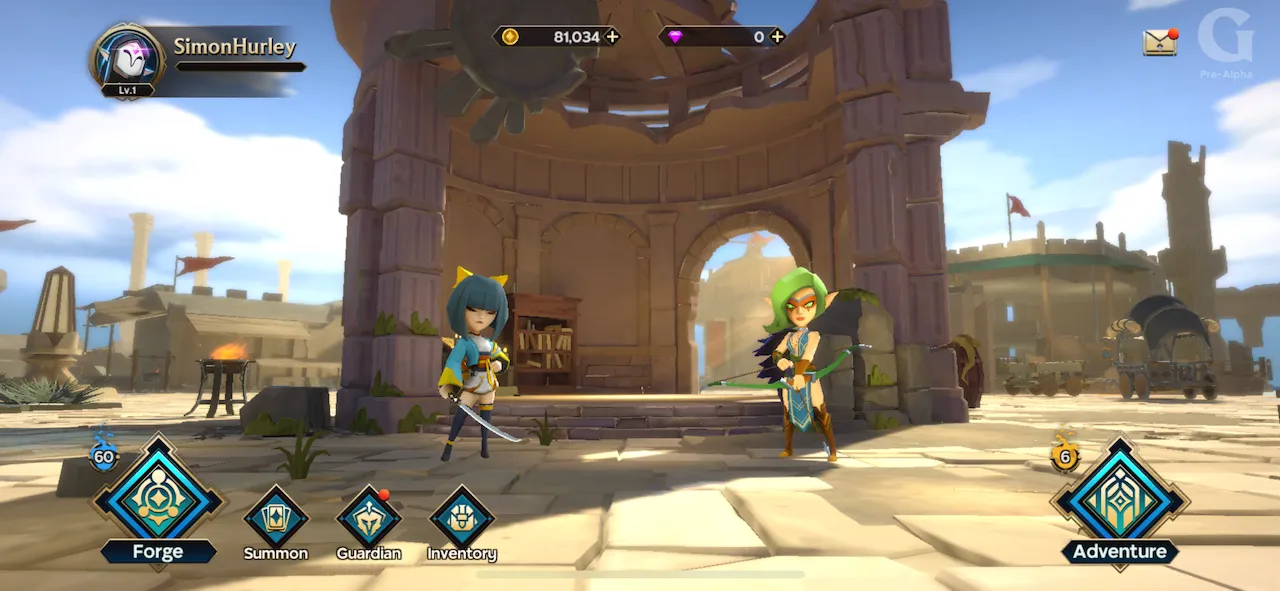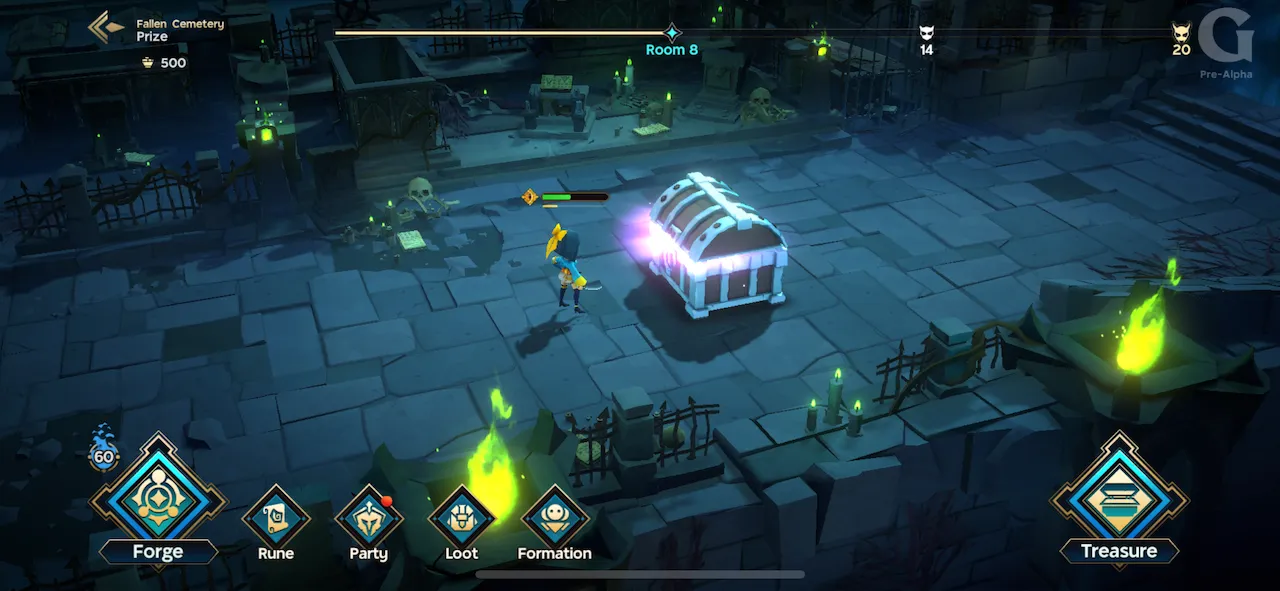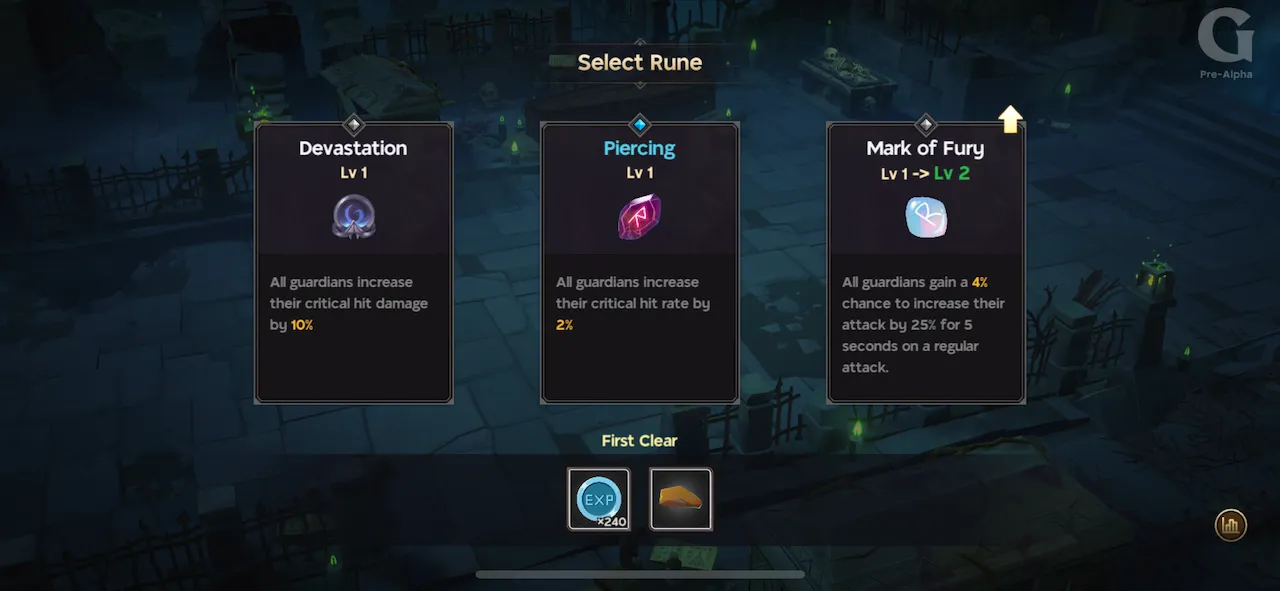Contents
PREVIEW: Immutable’s upcoming Guild of Guardians blends dungeon strategy with casual, mobile fun. We go hands-on.
•
This story comes from GG.
Your Web3 Gaming Power-Up
Discover GG
Guild of Guardians is a crypto-fueled, “roguelite” role-playing game (RPG) that’s long been in the works for iOS and Android, but it’s starting to inch closer to release following a development reboot earlier this year.
Crypto firm Immutable and developer Mineloader are behind the game, which is currently in a pre-alpha testing stage and recently launched a limited demo called “The Beautiful Corner.”
Decrypt was able to play the guided demo with developers, and get some hands-on experience with the upcoming title. Even in a pre-alpha state, it already shows promise as a potentially addictive casual mobile game with NFTs and crypto tokens in the mix.

Pre-alpha overview
Guild of Guardians (GoG) Game Director Chris Clay, who previously shipped video games based on Magic: The Gathering and DC Comics superheroes, explained that the pre-alpha version is designed to present the game’s two core loops of dungeon combat and crafting/forging.
In his view, GoG is an ideal game for multitaskers or people who don’t feel like they have to give a mobile game their undivided attention. In other words, it’s designed to be a game for those idle moments in life—or an option for hyperactive folks that always need to feel like they’re progressing on something.
Guild of Guardians focuses on a core conflict between the hero Guardians and the evil Dread looking to destroy their world. The lore is still in development, however, and the version I tested included clear placeholder spots for additional story material.
Immutable’s game will feature NFTs for player-owned characters, pets, and other in-game items across Ethereum and scaling network Immutable X, plus the game has its own crypto token. Guild of Guardians also teamed with popular esports clubs, including Cloud9 and Team Liquid, to release themed NFT characters.
However, the pre-alpha test build didn’t contain any of that yet, nor features like the store, tutorials, missions, or further crafting options like salvaging and repairing items, along with other planned features. Instead, this pared-down version offered item crafting, forging, and leveling up in dungeons, among other core features.
Colorful fantasy vibe
For a pre-alpha mobile game, Guild of Guardians is already off to a strong start. The 3D graphics are appealing, and the game’s aesthetic feels like a healthy mix of colorful, sprite-like characters within a dark fantasy world.
There’s an obvious good-and-evil binary vibe here, but some players may find this familiarity appealing. The audio is already epic and cinematic, too, but doesn’t appear to provide players necessary clues—perhaps to better serve casual players who’d have it muted while playing anyway.

Guild of Guardians also provides players with broader 2D dungeon maps that offer a general geographic sense of where you’ll be fighting, giving the impression that you’re progressing despite not actually being able to move around much in-game.
The game gives players tons of dungeon time without the stress of a real-time, player-versus-player (PVP) game or an open-world, massively multiplayer online role-playing game (MMORPG), in which random enemies could attack at any moment. In other words, it’s massively streamlined to make it ideal for mobile play.
Dungeon crawling
Even so, the dungeon-fighting experience in Guild of Guardians gets interesting for competitive players once you’re able to add multiple Guardians to your party and strategize on positioning. You’ll also have to consider which traits or “runes” you want them to pick up as you progress through a lengthy dungeon.
Standard dungeons consist of 20 rooms each, with different options generated at random at the end of each dungeon room. “Hard” dungeons will have 30 rooms, Clay said, and there’s also an option for “unlimited” dungeons for more hardcore players who really want to dig in for a serious challenge.

In the limited playtest, I didn’t find any way to heal my characters in battle—which is not surprising given the “roguelite” classification.
Roguelikes are especially challenging games, typically dungeon crawlers, that include uncompromising elements like permanent death (or “permadeath”) when you lose in battle. A roguelite, by comparison, typically only maintains some of those aspects and generally isn’t as brutal in its hardcore design.
Once crafting consumables and the other planned features are added to the game, it’s possible players will be able to spend more time crafting and preparing for battle than dying and restarting, and will progress faster with fewer defeats than I encountered. Still, Clay suggested that it probably won’t be a walk in the park.
“Defeat is a natural part of Guild of Guardians,” he explained in the demo call.
Death and defeat can be common in GoG—but in the version I played, the stakes weren’t very high. If your Guardian or Guardians are defeated, you can simply try again. But because your characters retain their gear and XP after death, it will get consistently easier to breeze through dungeon rooms that previously gave you trouble.
Casual crafting
The current crafting and forging loop is pretty intuitive. Even without tutorials, I was able to figure out how to make basic items after winning the materials by clearing dungeon rooms. Guild of Guardians doesn’t make you sift through pages of items to find crafting ingredients for yourself like many PC RPGs. Instead, it simplifies the process and shows what you can and can’t make based on which “recipes” you’ve acquired.
Also, unlike in hardcore PC RPGs and MMORPGs, leveling up is fast here. In less than an hour of playtesting, I was able to power up two characters to level 20 or higher without much effort. Some characters will max out at level 120, while others will have higher caps of around 140, but there’s also a “star up” leveling system that adds an extra layer of complexity to the process.
Guild of Guardians is billed as a “companion” mobile game, meaning it’s been designed for casual, somewhat idle play. But from what I’ve played so far, it offers a healthy mix of randomness and strategy that could make it appealing to RPG fans who can’t grind for hours on their PCs—but can maybe carve out a few minutes on their phones.






